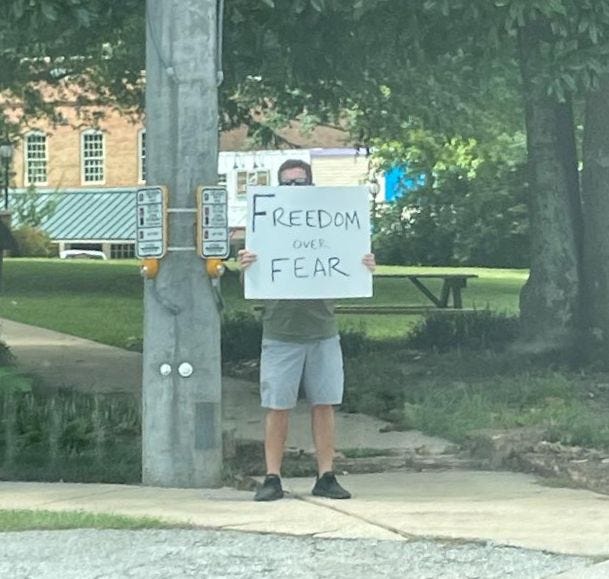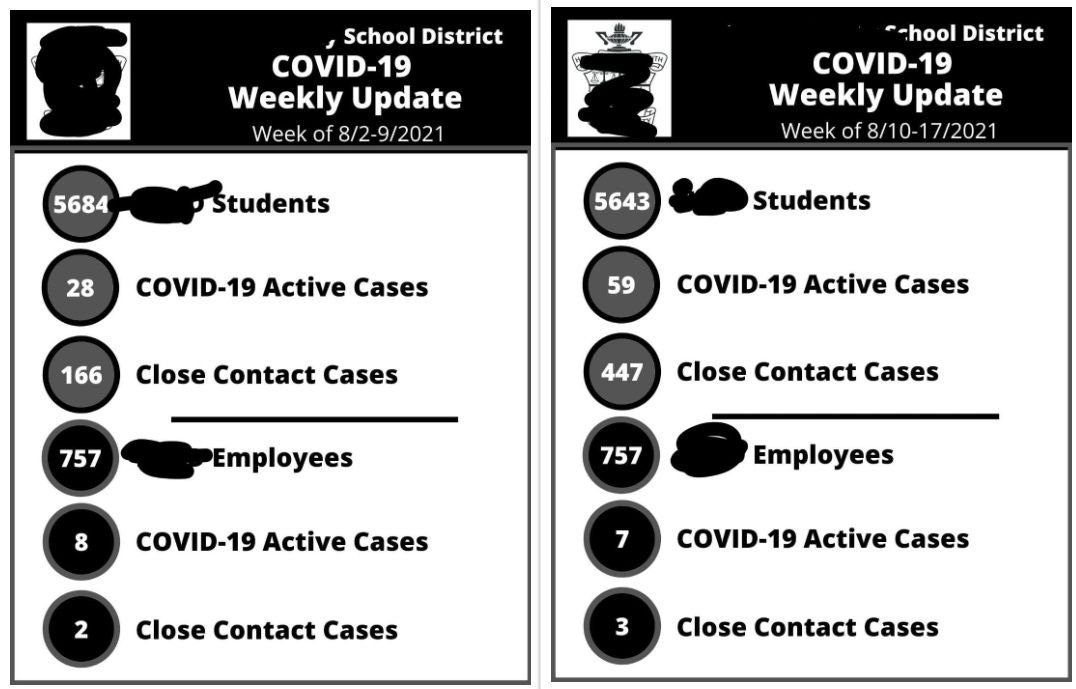Steve Berman asked some excellent questions about where we go from here with respect to COVID in his piece this morning. I don’t disagree with anything Steve said but I do have some additional thoughts to add to the conversation. As is often the case, I was planning to write on the pandemic today anyway so Steve’s piece dovetails nicely with my own.
First, Steve correctly points out that vaccine effectiveness is not as strong against the Delta variant as against the Alpha variant for which they were originally designed. Some people, Steve is not among them, take this to mean that the vaccines are failures. That is not true. Even a vaccine of reduced effectiveness is still better than relying on natural immunity.
To demonstrate this fact, consider my family’s experience. As I’ve written before, my entire family is vaccinated and has been for several months. In late July, my wife became a breakthrough case when we had an outbreak at our church. Even though there were several breakthrough cases in the cluster, the most severe outcomes were among the unvaccinated, including one woman who is still on the ventilator and another woman who lost her baby a few days after testing positive. One of the lesser-known aspects of COVID-19 is the increased risk of stillbirths among pregnant women.
My point, however, is that my two kids and I never contracted the virus despite being in close contact with my wife for several days before she developed symptoms and tested positive. This would have been the period when she was most contagious.
And it wasn’t just that we didn’t develop symptoms, we were tested a few days later with negative results. This would make the combination of Johnson & Johnson and Pfizer vaccines 75 percent effective at stopping infection in my family’s anecdotal example.
On the other hand, my brother’s family was infected at about the same time. His daughter was infected first and then it spread to his wife before infecting my brother and their other two children. Everyone in his family was unvaccinated and they all got sick to some degree. None of them went to the hospital, but COVID-19 seems to me to be a disease that it’s better not to have, even if you don’t have a serious case.
And that is also true if you’re vaccinated. My wife’s case could be considered mild, but it took most of her isolation period to get to the point where she felt like resuming anything like normal activities. At this point, three weeks after her positive test and almost four weeks after her infection she still has lingering symptoms of occasional coughing, shortness of breath, fatigue, mental fog, and she has not regained her sense of smell. As annoying as all that is, I suspect that it would have been worse without the vaccine.
Debi’s breakthrough infection came at a time when cases and deaths are spiking in many states. Here in Georgia, there is no mask mandate and ICUs are filling up. Steve and I live in different parts of the state, but I’ve noticed the same variations in voluntary masking in different stores that he mentions.
I’ve noticed an additional difference as well. In my unscientific survey, it seems that black patrons are far more likely to be masked than whites. There could be a couple of reasons for this. We know that Republicans are very resistant to vaccinations, but we also know that blacks and Hispanics are also less likely to get vaccinated than whites. This may translate into a higher level of mask-wearing among these groups because they realize the danger of the virus even though they are skeptical about the vaccines.
For many Republicans, however, the resistance does not end at vaccines but includes other forms of mitigations. For these people, not only do they refuse vaccinations but they also refuse to wear masks or social distance.
An example occurred in our local school system. Here in Georgia, most schools have been in session for several weeks now. My county started without a mask mandate for students, but teachers were required to wear them. After about a week, the Board of Education decided to implement a mask mandate for students, provoking much weeping and gnashing of teeth and rending of garments from the social media Karens. (I apologize to good Karens everywhere for using the phrase because the angry social media mob was not just women. The photo accompanying this article is a lone male protester on our town square earlier this week.)
The reason for the reversal was interesting and enlightening. Below are two consecutive weekly COVID updates from my county. I’ve deidentified them for privacy reasons, but you can see why the BOE was alarmed. Over the first week of school, active student COVID cases more than doubled and close contact cases requiring quarantine almost tripled. On the other hand, cases among school employees declined by one and there was only one additional close contact case.
There are a few obvious reasons for the starkly different outcomes. First, teachers are eligible for vaccines, but not all students are. Second, teachers were required to wear masks. Finally, it is probably easier for teachers to social distance than it is for students, given crowded hallways, classrooms, and buses.
The takeaway here is that vaccinations, paired with masks and social distancing, can stop the spread of the virus. Another takeaway is that those mitigations may have to be mandatory because when they are voluntary, as they were for the students, chaos reigns and the chain is only as strong as its weakest link.
But what, as Steve asks, do we do next? No one wants to wear masks indefinitely, especially after they are vaccinated. And not many people want to get vaccinated every six to eight months. I have some ideas on this score but no hard answers.
First, I’ve talked to several people who had COVID prior to being vaccinated. A lot of these people told me that the first of the two-shot series was worse for them, unlike the people who had never had COVID and who thought the second shot was worse. Based on that anecdotal evidence, booster shots might be routine matters without the need for downtime. This is speculation, but I wonder if the vaccines might provoke a strong reaction only one time in most people. If that turns out to be true, COVID boosters would be no worse than a flu shot.
However, even if there is a strong reaction, there is a cost-benefit consideration for taking the booster anyway. If we have to use a sick day to get the vaccine booster, it’s still better than being sick for a week or three with the real virus. Companies might not even charge employees for the time off to encourage keeping the vaccinations up to date.
Second, there will soon be new weapons in the fight against COVID-19. There is already a second generation of COVID vaccines. Several of these drugs are already in trials or about to begin them. Hopefully, these new vaccines will elicit a heightened immune response against the virus that will be effective against the Delta and Lambda strains and require fewer boosters.
Second, it may be that COVID fades into the background, even if it doesn’t go away. At a point where most people have either been infected, vaccinated, or both, the possibility of a severe case of COVID should diminish drastically. At that point, the threat might really be about like the flu. Boosters might be recommended for at-risk seniors and people with underlying health problems but not for the general population.
An additional possibility that I discussed a few weeks ago is that future generations might contract COVID-19 as babies or young children. In this case, they may develop antibodies and immunity before the disease becomes threatening. In this scenario, COVID-19 would also not disappear but would no longer be the threat that it is today.
Personally, I think the most likely solution is that we update the vaccines on an as-needed basis to match new mutations. I foresee that many states will eventually require COVID vaccinations for school and employment. Even red states will quietly add the requirement after the hysteria dies down. This is the same strategy that we used to defeat other diseases such as polio, measles, and chickenpox.
Despite the new variants, the pandemic is going to end somehow, some way, and probably sooner rather than later. Vaccinations are going to be a significant part of the story of how we beat COVID-19. Until then, we have masks and social distancing to see us through the short term.


No comments:
Post a Comment